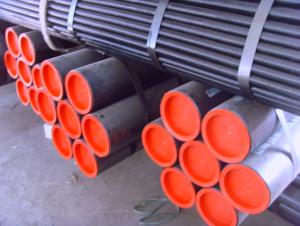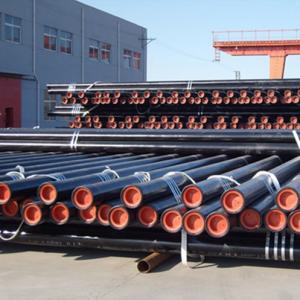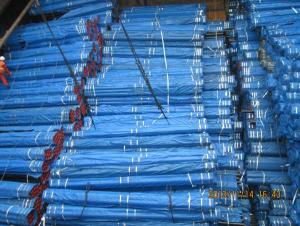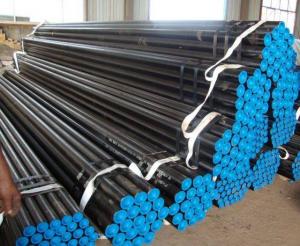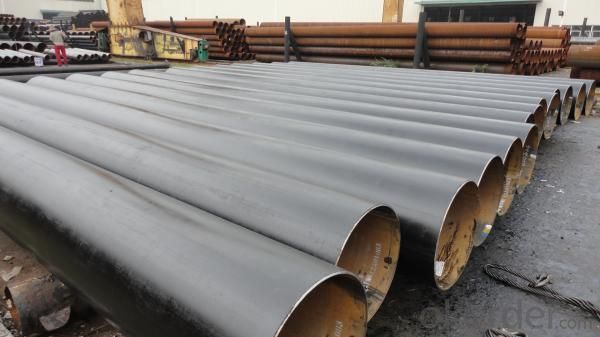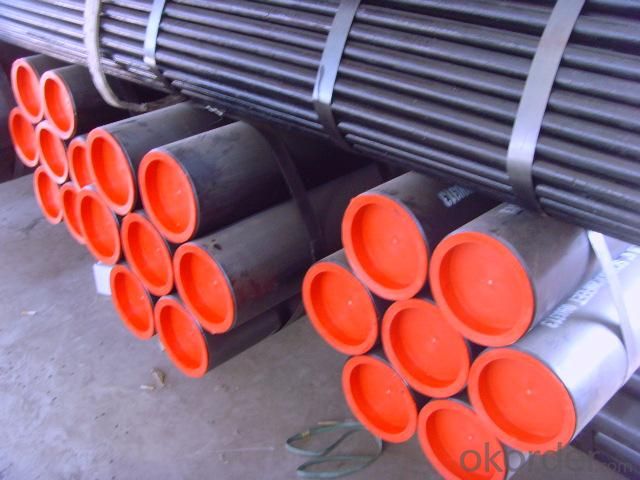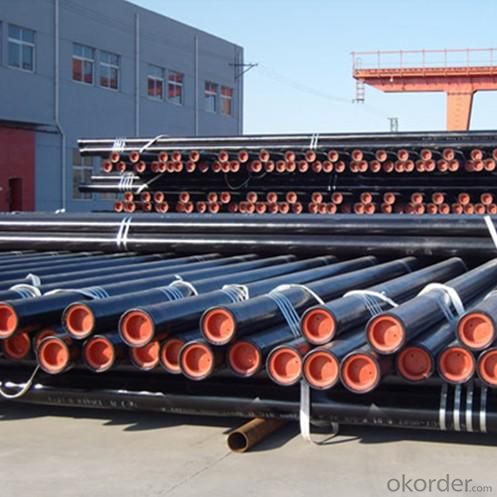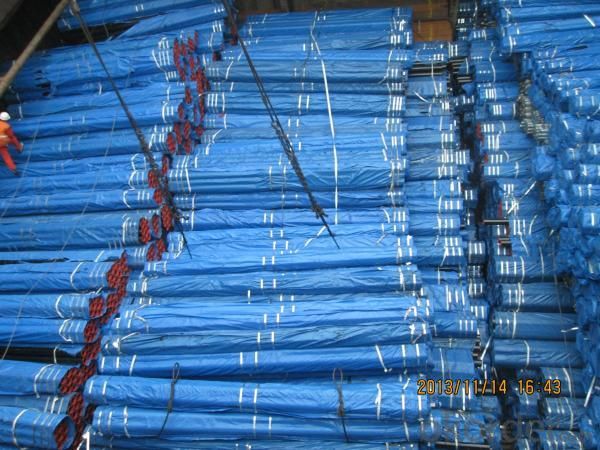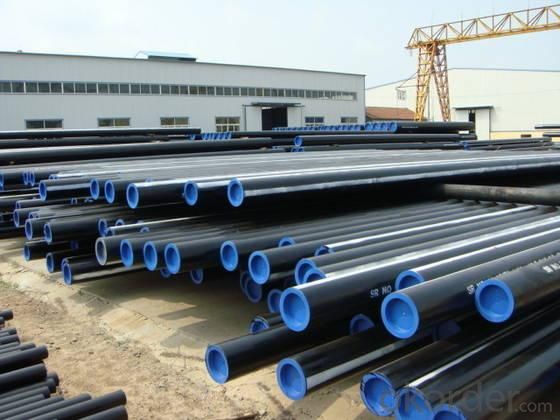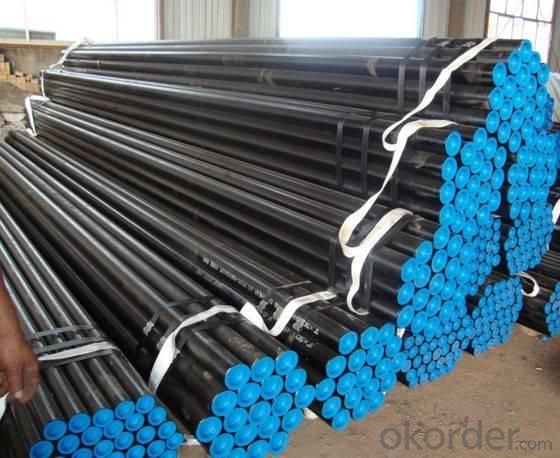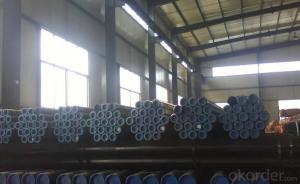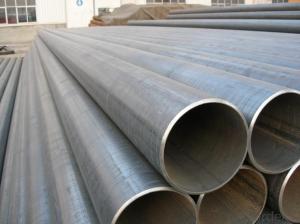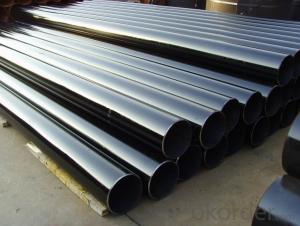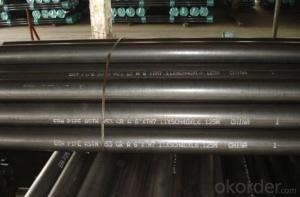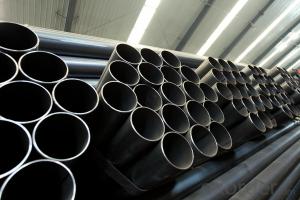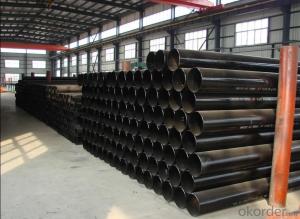High Quality API SPEC 5L ERW Welded Steel Pipes Used For Oil, Gas And Petroleum
- Loading Port:
- China Main Port
- Payment Terms:
- TT or L/C
- Min Order Qty:
- 50MT m.t.
- Supply Capability:
- based on order m.t./month
OKorder Service Pledge
OKorder Financial Service
You Might Also Like
High Quality API SPEC 5L ERW Welded Steel Pipes Used For Oil, Gas And Petroleum
Usage/Applications Of High Quality API SPEC 5L ERW Welded Steel Pipes Used For Oil, Gas And Petroleum:
It is widely applied to line pipe and casing and tubing in oil transportation and casing field, and it is used in Low, high pressure liquid and gassy transportation and it is also good Structure pipe (for furniture, window, door, building , bridge, mechanical etc).
Packaging & Delivery Of High Quality API SPEC 5L ERW Welded Steel Pipes Used For Oil, Gas And Petroleum
Packed by bundles with anti-rust painting and with plastic caps
Delivery by bulk vessel or container.
Standard Of High Quality API SPEC 5L ERW Welded Steel Pipes Used For Oil, Gas And Petroleum:
API SPEC 5L, API SPEC 5CT, ASTM A53, GB/T9711.1
Steel Grade Of High Quality API SPEC 5L ERW Welded Steel Pipes Used For Oil, Gas And Petroleum:
API SPEC 5L: B, X42, X46, X52, X56, X60, X65
API SPEC 5CT: J55, K55, N80, L80-1
ASTM A53: A, B, C
GB/T9711.1:L242、L290、L320、L360、L390、L415、L450
Sizes Of High Quality API SPEC 5L ERW Welded Steel Pipes Used For Oil, Gas And Petroleum:
OD: 1/2"-24" WT: SCH40-SCHXXS Length: 5.8M-12M
Standard Of High Quality API SPEC 5L ERW Welded Steel Pipes Used For Oil, Gas And Petroleum:
API SPEC 5L
Mechanical Properties
Standard | Grade | (MPa) | (MPa) | ||
Yield strength | Tensile Strength | ||||
API SPEC 5L | PSL1 | ||||
B | ≥241 | ≥414 | |||
×42 | ≥290 | ≥414 | |||
×46 | ≥317 | ≥434 | |||
×52 | ≥359 | ≥455 | |||
×56 | ≥386 | ≥490 | |||
×60 | ≥414 | ≥517 | |||
×65 | ≥448 | ≥531 | |||
×70 | ≥483 | ≥565 | |||
PSL2 | |||||
Min | Max | Min | Max | ||
B | 241 | 448 | 441 | 758 | |
×42 | 290 | 496 | 414 | 758 | |
×46 | 317 | 524 | 434 | 758 | |
×52 | 359 | 531 | 455 | 758 | |
×56 | 386 | 544 | 490 | 758 | |
×60 | 414 | 565 | 517 | 758 | |
×65 | 448 | 600 | 531 | 758 | |
×70 | 483 | 621 | 565 | 758 | |
Chemical Composition (%)
Standard | Grade | C | Mn | P | S | TI | CEV |
Max | Max | Max | Max | Max | Max | ||
API SPEC 5L | PSL1 | ||||||
B | 0.26 | 1.2 | 0.030 | 0.030 | 0.04 |
- | |
×42 | 0.26 | 1.3 | 0.030 | 0.030 | 0.04 | ||
×46,×52,×56,X60 | 0.26 | 1.4 | 0.030 | 0.030 | 0.04 | ||
X65 | 0.26 | 1.45 | 0.030 | 0.030 | 0.06 | ||
X70 | 0.26 | 1.65 | 0.030 | 0.030 | 0.06 | ||
PSL2 | |||||||
B | 0.22 | 1.20 | 0.025 | 0.015 | 0.04 |
0.43 | |
×42 | 0.22 | 1.30 | 0.025 | 0.015 | 0.04 | ||
×46,×52,×56, X60 | 0.22 | 1.40 | 0.025 | 0.015 | 0.04 | ||
X65 | 0.22 | 1.45 | 0.025 | 0.015 | 0.06 | ||
X70 | 0.22 | 1.65 | 0.025 | 0.015 | 0.06 | ||
Standard: GB/9711.1
Mechanical Properties
Standard | Grade | (MPa) | (MPa) | Min(%) |
Yield strength | Tensile Strength | Elongation | ||
GB/T9711.1 | L245 | ≥245 | ≥415 | 21 |
L290 | ≥290 | ≥415 | 21 | |
L320 | ≥320 | ≥435 | 20 | |
L360 | ≥360 | ≥460 | 19 | |
L390 | ≥390 | ≥490 | 18 | |
L415 | ≥415 | ≥520 | 17 | |
L450 | ≥450 | ≥535 | 17 | |
L485 | ≥485 | ≥570 | 17 |
Chemical Composition (%)
Standard | Grade | C | Mn | P | S |
Max | Max | Max | Max | ||
GB/T9711.1 | L245 | 0.26 | 0.15 | 0.030 | 0.030 |
L290 | 0.28 | 1.25 | 0.030 | 0.030 | |
L320, L360 | 0.30 | 1.25 | 0.030 | 0.030 | |
L390, L415 | 0.26 | 1.35 | 0.030 | 0.030 | |
L450 | 0.26 | 1.40 | 0.030 | 0.030 | |
L485 | 0.23 | 1.60 | 0.025 | 0.030 |
Standard: GB/9711.2
Mechanical Properties Of High Quality API SPEC 5L ERW Welded Steel Pipes Used For Oil, Gas And Petroleum:
Standard | Grade | (MPa) Yield strength | (MPa) Tensile Strength | Min(%) Elongation | ||
GB/T9711.2 | Rt0.5Min | Rt0.5Max | RmMin | Rt0.5/Rm Max | ||
L245 |
245 |
440 | 0.80 |
22 | ||
L245 | 0.85 | |||||
L290 |
290 |
440 | 0.80 | 21 | ||
L290 | 0.85 | |||||
L360 |
360 |
510 | 0.85 |
20 | ||
L360 | 0.85 | |||||
L415 |
415 |
565 | 0.85 |
18 | ||
L415 | 0.85 | |||||
L450 | 450 | 570 | 535 | 0.87 | 18 | |
L485 | 485 | 605 | 570 | 0.90 | 18 | |
Chemical Composition Of High Quality API SPEC 5L ERW Welded Steel Pipes Used For Oil, Gas And Petroleum(%):
Standard | Grade | C | Mn | P | S | V | Nb | Ti | CEV |
Max | Max | Max | Max | Max | Max | Max | Max | ||
GB/T9711.2 | L245NB | 0.16 | 1.1 | 0.025 | 0.020 | - | - | - | 0.42 |
L290NB | 0.17 | 1.2 | 0.025 | 0.020 | 0.05 | 0.05 | 0.04 | 0.42 | |
L360NB | 0.20 | 1.6 | 0.025 | 0.020 | 0.10 | 0.05 | 0.04 | 0.45 | |
L415NB | 0.21 | 1.6 | 0.025 | 0.020 | 0.15 | 0.05 | 0.04 | - | |
L245NB, L290NB |
0.16 |
1.5 | 0.025 | 0.020 |
0.04 |
0.04 |
- |
0.4 | |
L360NB | 0.16 | 1.6 | 0.025 | 0.020 | 0.05 | 0.05 | 0.04 | 0.41 | |
L415NB | 0.16 | 1.6 | 0.025 | 0.020 | 0.08 | 0.05 | 0.06 | 0.42 | |
L450NB | 0.16 | 1.6 | 0.025 | 0.020 | 0.10 | 0.05 | 0.06 | 0.43 | |
L485NB | 0.16 | 1.7 | 0.025 | 0.020 | 0.10 | 0.06 | 0.06 | 0.43 |
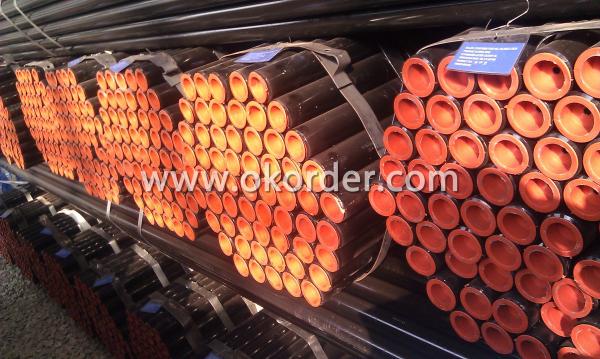
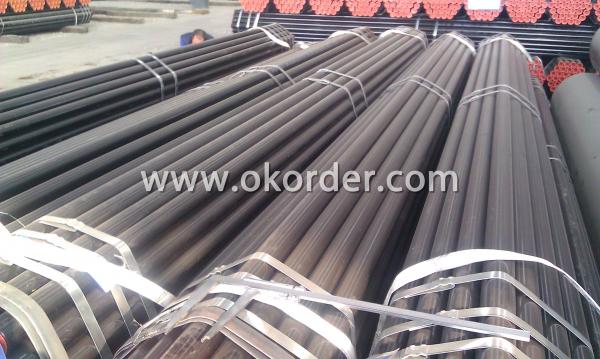
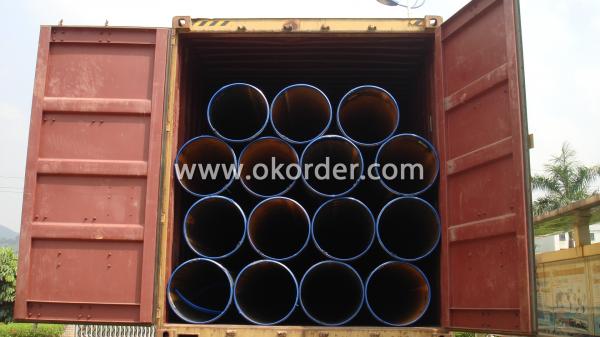
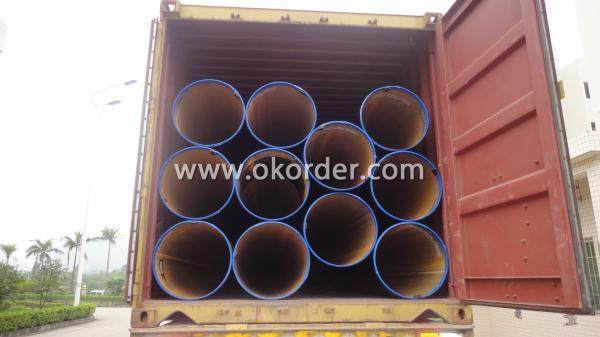
- Q: Can steel pipes be used for underground cooling systems?
- Yes, steel pipes can be used for underground cooling systems. Steel pipes are commonly used in various applications, including underground cooling systems, due to their durability, strength, and resistance to corrosion. They can effectively handle the high pressure and temperature demands of cooling systems. Additionally, steel pipes can be welded or threaded together, allowing for easy installation and maintenance. However, it is important to ensure that the steel pipes are properly coated or insulated to prevent corrosion and maintain efficiency in heat transfer.
- Q: Can steel pipes be used for underground applications?
- Yes, steel pipes can be used for underground applications. They are commonly used for various purposes such as water and sewage systems, natural gas and oil pipelines, and underground infrastructure projects. Steel pipes are durable, strong, and resistant to corrosion, making them suitable for underground environments.
- Q: How are steel pipes cleaned and maintained?
- Steel pipes are cleaned and maintained through various methods. The process typically involves removing any debris or rust from the pipes using wire brushes or sandblasting. After cleaning, a protective coating is applied to prevent corrosion. Regular inspections and maintenance checks are also conducted to identify any potential issues such as leaks or weak points, ensuring the pipes remain in optimal condition.
- Q: What are the different methods of joining steel pipes for high-pressure applications?
- Some of the different methods of joining steel pipes for high-pressure applications include welding, threaded connections, flanged connections, and mechanical couplings. Welding involves fusing the pipes together using heat, making it a strong and permanent connection. Threaded connections involve screwing the pipes together using threads on the ends, which can be easily assembled and disassembled. Flanged connections involve using flanges and bolts to connect the pipes, providing a secure and leak-proof connection. Mechanical couplings use mechanical devices such as clamps or compression fittings to join the pipes, allowing for quick and easy installation and removal.
- Q: What is the difference between the stainless steel pipe welded pipe and seamless pipe?
- Seamless tube is a strip of steel with a hollow cross section and no seams at all. The general is rolled into a cylindrical tube plate welding.
- Q: How are steel pipes used in stadium construction?
- Steel pipes are commonly used in stadium construction for various purposes such as structural support, roofing, and plumbing systems. They provide strength and durability to the overall structure of the stadium, allowing it to withstand heavy loads and adverse weather conditions. Steel pipes are also used for the installation of HVAC systems, water supply lines, and drainage systems within the stadium.
- Q: How are steel pipes used in the construction of oil storage tanks?
- Steel pipes are used in the construction of oil storage tanks as they provide strength and durability to withstand the weight and pressure of the stored oil. These pipes are utilized for the tank's structural framework, ensuring stability and preventing leakage. Additionally, steel pipes are commonly used for the tank's piping system, allowing for the transportation of oil in and out of the storage facility.
- Q: Are steel pipes fire resistant?
- Yes, steel pipes are fire resistant. Steel is a non-combustible material, meaning it does not catch fire or contribute to the spread of flames. Steel pipes have a high melting point and are able to withstand extreme temperatures, making them suitable for use in applications where fire resistance is required. Additionally, steel is a durable material that does not degrade or lose its structural integrity when exposed to fire. This makes steel pipes a common choice for fire protection systems, such as sprinkler systems in buildings, as well as for industrial applications where fire hazards are present.
- Q: What are the applications of galvanized steel pipes?
- Galvanized steel pipes have a wide range of applications across various industries. They are commonly used in plumbing systems for water supply and drainage systems due to their corrosion resistance and durability. Additionally, they are used in the construction industry for structural supports, scaffolding, and fencing. Galvanized steel pipes are also widely utilized in agricultural irrigation systems and in the transportation of liquids and gases.
- Q: What are the environmental impacts of using steel pipes?
- The environmental impacts of using steel pipes include the extraction and processing of raw materials, such as iron ore and coal, which contribute to deforestation, habitat destruction, and greenhouse gas emissions. The manufacturing process also generates significant amounts of waste, including slag and emissions from steel production. The transportation and installation of steel pipes contribute to carbon emissions, while their corrosion and maintenance may result in the release of toxic substances into the environment. Proper waste management and implementing sustainable practices can help mitigate some of these impacts.
1. Manufacturer Overview
| Location | Hebei,China |
| Year Established | 2005 |
| Annual Output Value | Above 100 Million RMB |
| Main Markets | Main land;Middle East;Southeast Asia |
| Company Certifications | ISO9001 |
2. Manufacturer Certificates
| a) Certification Name | |
| Range | |
| Reference | |
| Validity Period |
3. Manufacturer Capability
| a) Trade Capacity | |
| Nearest Port | Tianjin;Qingdao |
| Export Percentage | 41% - 50% |
| No.of Employees in Trade Department | |
| Language Spoken: | English;Chinese;Korean |
| b) Factory Information | |
| Factory Size: | 120mu |
| No. of Production Lines | 11 |
| Contract Manufacturing | OEM Service Offered;Design Service Offered |
| Product Price Range | High Average |
Send your message to us
High Quality API SPEC 5L ERW Welded Steel Pipes Used For Oil, Gas And Petroleum
- Loading Port:
- China Main Port
- Payment Terms:
- TT or L/C
- Min Order Qty:
- 50MT m.t.
- Supply Capability:
- based on order m.t./month
OKorder Service Pledge
OKorder Financial Service
Similar products
Hot products
Hot Searches
Related keywords

